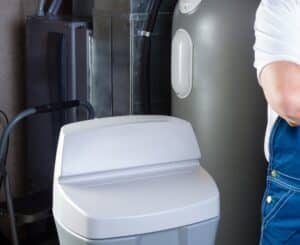
Unusual mineral crystallization inside plumbing pipes
Mineral crystallization occurs when dissolved minerals in water solidify, forming crystals that can adhere to the inside of plumbing pipes. These minerals, typically calcium or magnesium, are naturally present in water. However, their concentration can lead to unexpected crystallization. Residents in Kennedale might notice these effects more during certain times of the year, depending on water source changes or treatment adjustments.
The presence of these crystal deposits can be a clear indicator of the water’s hardness. In Mansfield, where water hardness can fluctuate, spotting these deposits early can help prevent potential plumbing issues. Regular checks and maintenance become crucial in managing the impact of mineral crystallization on your home’s plumbing system.
Addressing mineral crystallization requires a thorough understanding of your water’s mineral content and the right approach to treatment. For homeowners in Mansfield and Kennedale, being informed about this rare but impactful phenomenon is the first step toward safeguarding their plumbing systems. Staying vigilant and proactive can help ensure that your water quality remains high and your pipes clear of unwanted mineral deposits.
Understanding Mineral Crystallization in Pipes
Understanding how mineral crystallization affects plumbing pipes is crucial for homeowners in Mansfield. This process begins when water, saturated with minerals like calcium and magnesium, starts to evaporate or cool within the pipes. As a result, these minerals form solid crystals, sticking to the interior surfaces. Over time, this buildup can lead to blockages, reducing water flow and potentially causing damage.
To identify mineral crystallization early, look for signs like reduced water pressure or changes in water quality. These symptoms suggest that crystals may be forming inside your pipes. Homeowners should take these signs seriously, as early detection can prevent more severe issues down the line. Regular inspections by professionals can help catch these deposits before they cause significant problems.
In areas like Kennedale, where water hardness might vary, understanding the local water composition is vital. Knowing the mineral content of your water can guide the best treatment options to prevent crystallization. For instance, installing a water softener can reduce mineral levels, minimizing the risk of crystal formation. Such preventive measures are essential in maintaining the health of your plumbing system.
Finally, addressing mineral crystallization involves more than just treating water. It requires a comprehensive approach, including regular plumbing maintenance and possibly adjusting your water usage habits. Homeowners in Mansfield and Kennedale can benefit greatly from staying informed and proactive about their water quality. By doing so, they can protect their homes from the unseen dangers of mineral crystallization inside their plumbing pipes.
The Science Behind Mineral Deposits in Plumbing
Delving into the science behind mineral deposits in plumbing reveals fascinating insights. When water laden with minerals like calcium and magnesium flows through pipes, it sometimes leaves behind a trace of these minerals. This process, known as mineral crystallization, happens when water conditions cause these dissolved minerals to solidify. Understanding this phenomenon is crucial for homeowners in Mansfield, as it directly impacts the longevity and efficiency of their plumbing systems.
Temperature changes play a significant role in mineral crystallization. Cold water can hold fewer dissolved minerals than hot water, which means that as water temperature fluctuates inside pipes, minerals are more likely to crystallize and form deposits. This is especially relevant in areas where water heating is common, making regular monitoring a necessity. By keeping an eye on water temperature and its effects, residents can better manage their plumbing health.
Water pH levels also influence mineral crystallization. Water that is too acidic or too alkaline can accelerate the formation of mineral deposits. Homeowners should test their water’s pH regularly to maintain a balance, preventing the excessive buildup of minerals. In Kennedale, where water quality might differ, such preventive measures are particularly beneficial, safeguarding pipes from the adverse effects of crystallization.
Finally, the flow rate of water through pipes affects how minerals deposit. Slow-moving water allows more time for minerals to settle and adhere to pipe walls. By ensuring a consistent flow rate, homeowners can reduce the risk of mineral buildup. Adopting such practices, along with understanding the underlying science of mineral crystallization, empowers residents to protect their plumbing systems effectively.
Common Types of Mineral Crystallization in Plumbing
Exploring the common types of mineral crystallization in plumbing reveals a variety of crystals that can form inside pipes. In Mansfield, calcium carbonate is a frequent culprit, forming hard, white deposits known as limescale. These deposits can significantly reduce water flow and efficiency in heating systems. Identifying them early helps in taking the necessary steps to mitigate their impact.
Another type often encountered is magnesium ammonium phosphate, also known as struvite. This mineral crystallization occurs in places like Kennedale, where the water might have varying levels of these minerals. Struvite forms in alkaline conditions and can lead to blockages in pipes. Understanding the specific conditions that lead to its formation is key to prevention.
Iron and manganese deposits also pose a challenge, creating reddish or black stains in plumbing fixtures. These minerals crystallize when water with high iron or manganese content is exposed to oxygen. In areas with such water characteristics, installing filtration systems can be an effective solution. Regular testing for these minerals can guide homeowners in choosing the right treatment options.
Lastly, silica can form hard, glass-like deposits that are challenging to remove. This type of mineral crystallization is less common but can occur in regions with high silica content in their water. Addressing silica buildup often requires professional intervention. Early detection and treatment can prevent the long-term effects of these deposits on plumbing systems.

How Water Quality Influences Mineral Deposits
Water quality plays a pivotal role in the occurrence of mineral crystallization within plumbing systems. In Mansfield, where water might vary in mineral content, the quality directly influences the type and extent of crystal deposits. High levels of calcium and magnesium, for instance, lead to more frequent crystallization, affecting pipes’ efficiency and longevity. Homeowners aware of their water’s mineral composition can take targeted actions to mitigate these effects, ensuring a healthier plumbing system.
In Kennedale, the situation underscores the importance of regular water quality assessments. Testing water for its hardness and mineral content allows residents to understand the risk of mineral crystallization in their plumbing. Such proactive measures can guide the installation of appropriate water treatment systems, such as water softeners or filters, tailored to address specific mineral concerns. This strategic approach helps in preventing the formation of harmful deposits.
Adjusting water treatment based on quality assessment results can significantly reduce the risk of mineral crystallization. For areas with hard water, employing water softeners that remove excess calcium and magnesium proves effective. This not only prevents the formation of limescale but also enhances the overall performance of water heaters and appliances. Residents taking these steps ensure their plumbing systems remain free from the adverse effects of mineral deposits.
Finally, educating homeowners about the connection between water quality and mineral crystallization is essential. By understanding how different water characteristics contribute to the formation of crystals, individuals can make informed decisions about their water treatment needs. Regular maintenance and water quality checks become a routine part of home care, safeguarding Mansfield and Kennedale homes from the potential damages caused by mineral crystallization.
Identifying and Diagnosing Mineral Crystallization
Identifying mineral crystallization in your plumbing system begins with recognizing unusual signs in your water flow and quality. Homeowners in Mansfield may notice a decrease in water pressure or a change in the water’s appearance, signaling the presence of mineral deposits. These early indicators can help prevent more severe issues by prompting a timely response. Consulting with a professional for a thorough inspection can confirm whether mineral crystallization is the culprit.
Diagnosing the exact type of mineral crystallization affecting your pipes requires a detailed analysis of your water. This step is crucial as different minerals demand specific treatment approaches. For residents in Kennedale, sending water samples to a laboratory can reveal the concentration of minerals like calcium, magnesium, or silica. Understanding the mineral makeup guides the selection of the most effective treatment solution.
Once the type of mineral crystallization is identified, homeowners can explore targeted treatment options. Implementing a water softening system might be recommended to tackle high levels of calcium and magnesium. This approach not only addresses the current crystallization but also prevents future occurrences, ensuring the longevity of your plumbing infrastructure.
Educating yourself about the signs and solutions for mineral crystallization empowers you to maintain a healthy plumbing system. Regular water quality checks and adopting preventive measures can safeguard your home against the challenges posed by mineral deposits. By staying informed and proactive, residents of Mansfield and Kennedale can enjoy clean, unobstructed water flow in their homes.

Preventive Measures for Mineral Deposits
Taking proactive steps to prevent mineral crystallization in your plumbing system is key to maintaining water flow and quality. In Mansfield, installing water softeners is a popular solution, as it directly addresses the high levels of calcium and magnesium that often lead to crystallization. This not only helps in reducing the formation of hard deposits but also prolongs the lifespan of your plumbing fixtures. Ensuring your system is equipped to handle the specific mineral content of your water can make a significant difference.
Regular maintenance checks are another effective strategy against the buildup of mineral deposits. By scheduling inspections with professionals, homeowners in Kennedale can catch early signs of crystallization before they escalate. These checks can include assessing water quality, examining pipes for signs of deposits, and flushing the system to remove any buildup. Staying ahead of the problem ensures that your plumbing remains in top condition.
Adjusting your water usage habits can also play a role in preventing mineral crystallization. For instance, avoiding excessive hot water use can reduce the likelihood of calcium carbonate forming in your pipes. This approach is simple but effective, as it minimizes the conditions that favor crystallization. Being mindful of how and when you use water can contribute to the overall health of your plumbing system.
Lastly, educating yourself about the factors that contribute to mineral crystallization is invaluable. Homeowners who understand the impact of water quality, temperature, and flow rate on their plumbing are better equipped to take preventive measures. This knowledge, combined with practical steps like installing water treatment systems and regular maintenance, can protect your home from the adverse effects of mineral deposits, ensuring clean and clear water flow.
Treatment Options for Mineral Crystallization
Exploring treatment options for mineral crystallization is essential for homeowners in Mansfield seeking to maintain their plumbing systems. One effective method is the installation of water softeners, which significantly reduce the concentration of minerals like calcium and magnesium. This approach not only prevents the formation of hard deposits but also enhances the efficiency of appliances. By adopting this solution, residents can ensure their water remains clear and free from unwanted mineral buildup.
In Kennedale, another viable treatment is the use of phosphate treatments, which can inhibit the crystallization process. These treatments work by adding small amounts of phosphates to the water, effectively preventing minerals from adhering to pipe walls. It’s a method that’s both cost-effective and easy to implement, offering a preventive measure against the accumulation of mineral deposits. Homeowners can benefit from this option by keeping their plumbing systems in optimal condition without extensive modifications.
Regular flushing of water heaters and pipes is also crucial in combating mineral crystallization. This process removes any accumulated minerals, thereby preventing blockages and maintaining water flow. It’s a simple yet effective maintenance routine that can significantly extend the life of your plumbing infrastructure. Engaging in this practice ensures that mineral deposits are kept at bay, safeguarding the integrity of your home’s water system.
Finally, consulting with a plumbing professional for customized treatment plans offers a tailored approach to managing mineral crystallization. Experts can assess the specific conditions of your water and recommend the most appropriate solutions. Whether it’s adjusting the pH level of your water or installing specialized filters, these personalized strategies can address the unique needs of your home. This proactive step empowers homeowners to effectively tackle mineral crystallization, ensuring their plumbing remains efficient and reliable.
The Impact of Mineral Deposits on Plumbing Health
Mineral crystallization within plumbing systems can significantly compromise the health of your home’s water infrastructure. In Mansfield, the presence of these mineral deposits is a telltale sign of underlying issues with water quality that, if left unchecked, can lead to costly repairs. By understanding the impact of these deposits, homeowners can take necessary steps to mitigate their effects. Regularly assessing and addressing water quality can prevent the formation of hard, crystal-like deposits that obstruct water flow and damage pipes.
The process of mineral crystallization is not just a concern for the efficiency of plumbing systems but also affects the longevity of appliances. Homeowners in Kennedale might notice that appliances such as water heaters and washing machines are more prone to breakdowns when mineral deposits accumulate. This is because the crystals can interfere with the normal operation of these appliances, leading to increased energy consumption and eventual failure. Taking proactive measures to control mineral content in water can thus save both energy and money.
Addressing the challenge of mineral crystallization requires a multifaceted approach. Installing water softening systems is a popular preventive measure, as it directly tackles the high mineral content in water that leads to crystallization. Additionally, homeowners should consider regular plumbing inspections to catch any early signs of mineral buildup. By keeping a close eye on the condition of their plumbing systems, residents can avoid the negative consequences of unchecked mineral deposits.
Finally, educating oneself about the factors that contribute to mineral crystallization is crucial. Homeowners who are informed about how water quality, temperature, and flow rate affect their plumbing are better equipped to prevent problems. Whether it’s adjusting water usage habits or investing in water treatment solutions, taking informed action can protect your home’s plumbing health. This proactive stance ensures that your plumbing system remains efficient, reliable, and free from the detrimental effects of mineral crystallization.
Frequently Asked Questions
What causes mineral crystallization in pipes?
Mineral crystallization in pipes happens when water with high mineral content flows through them. Over time, these minerals deposit on the pipe walls, forming crystals. Factors like water temperature and pressure can speed up this process. Understanding this can help in managing and preventing pipe damage effectively.
How to identify mineral buildup in plumbing?
Identifying mineral buildup in plumbing is straightforward. Look for reduced water flow or changes in water pressure as key signs. Discolored water or an unusual taste can also indicate the presence of mineral deposits. Regular inspections can catch these symptoms early, preventing more serious issues.
Can mineral crystallization block water flow?
Yes, mineral crystallization can indeed block water flow in pipes. As minerals build up, they narrow the space water can pass through. This reduction can significantly decrease water pressure and flow. Regular checks and maintenance can prevent such blockages, ensuring smooth water delivery.
What are signs of unusual mineral deposits?
Signs of unusual mineral deposits include strange noises from your pipes, indicating blockages. You might also notice water discoloration, suggesting impurities. Appliances using water, like heaters, may lose efficiency. Lastly, an increase in water bills can hint at hidden mineral crystallization affecting flow.
How to prevent mineral crystallization in pipes?
Preventing mineral crystallization in pipes involves a few key steps. First, installing a water softener can significantly reduce hard minerals in your water supply. Regularly flushing out your plumbing system also helps clear any beginning deposits. Finally, consider professional inspections to catch and address any issues early, keeping your pipes clear and functional.

